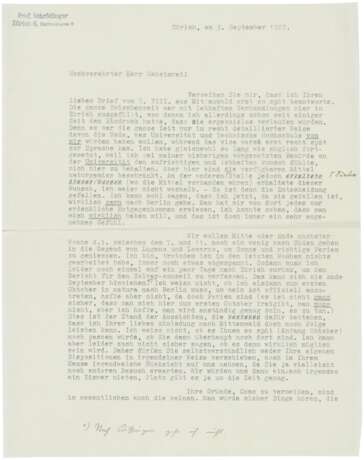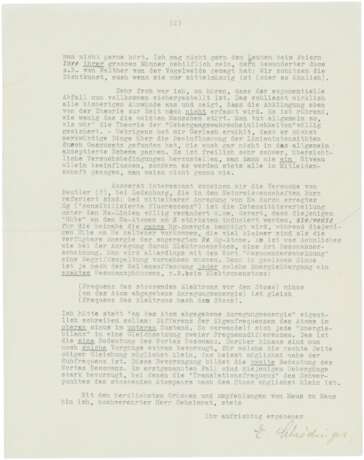ID 370001
Lot 12 | Criticising Mussolini and discussing exponential decay
Estimate value
£ 1 500 – 2 000
Typed letter signed (‘E. Schrödinger’) to [Wilhelm Wien: ‘Hochverehrter Herr Geheimrat!’], Zurich, 3 September 1927.
In German. Two pages, 280 x 220mm, address stamp, autograph emendations (small splits at folds). Provenance: by descent from the recipient.
Swapping Zurich for Berlin, criticising Mussolini and discussing exponential decay. Schrödinger reports with some regret that ‘lively’ negotiations over the past months with the university authorities at Zurich have been ultimately unsuccessful and he is to leave his post. Although he would have liked to remain, the available resources were inadequate; he is content with his decision to move to Berlin, where every conceivable accommodation has been offered to him: ‘I could see that they truly wanted me, which is always a very pleasant feeling’. He sets out his obligations over the coming months: after a holiday in the south, he must return to Zurich to prepare a paper for the Solvay Conference, and is unsure as to whether he must travel to Berlin in October to formally take up his post; following this, he hopes to accept Wien’s invitation to Mittenwald. He shares Wien’s reasons for avoiding Como: ‘One would certainly hear things that one would not like. I do not like to assist people in celebrating their great men’; of the ‘admired Duce’ [Mussolini], he offers an oblique assessment in the form of a line he attributes to Walther von der Vogelweide: ‘We prize poetry, even if it is only mediocre’. Switching to scientific matters, Schrödinger is pleased to hear that an observation of exponential decay [exponentielle Abfall] has been accepted, negating earlier objections and demonstrating that the decay is not currently explicable through the theory as it stands – though an attempt is generally made through the use of transition possibilities [Übergangswahrscheinlichkeiten]. In related news, [Walther] Gerlach has shared some very strange findings for the impact of gas on the intensity of spectral lines. Schrödinger’s interest has also been piqued by the experiments of [Hans] Bütler, brought to his attention by [Rudolf] Ladenburg, involving the excitation of sodium and mercury atoms – he goes on to describe his thoughts on the nature of resonance phenomena to his friend in some detail.
Schrödinger joined the University of Zurich in 1921, filling the chair for theoretical physics that had lain vacant since 1914: he would leave the university six years later having revolutionised particle physics and gained international fame following the publication of his celebrated equation in 1926. Tempted to Friedrich Wilhelm University to assume a post recently vacated by Max Planck, Schrödinger spent the next six years in Berlin, where he taught alongside Einstein; in 1933 he would leave Germany for England, in objection to the anti-semitic policies of the National Socialist government. In the present letter, Schrödinger appears to refer to celebrations to mark the completion of the Stadio Giuseppe Sinigaglia in Como, built at the behest of Benito Mussolini: his dim opinion of Italy’s leader is quite clear. The letter also makes reference to the latest experiments in his field of quantum theory – news of the work undertaken by his erstwhile research assistant Erwin Fues (1893-1970), now under Niels Bohr at Copenhagen, on resistance phenomena and exponential decay excites his interest.
| Category: | Autographs and letters |
|---|
| Category: | Autographs and letters |
|---|
| Address of auction |
CHRISTIE'S 8 King Street, St. James's SW1Y 6QT London United Kingdom | |
|---|---|---|
| Preview |
| |
| Phone | +44 (0)20 7839 9060 | |
| Buyer Premium | see on Website | |
| Conditions of purchase | Conditions of purchase |




